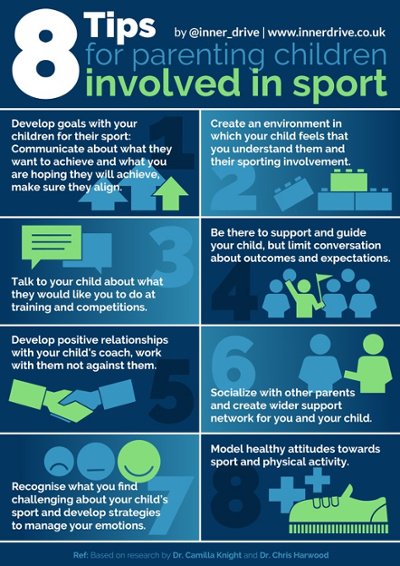Parenting Youth Footballers
What is the secret to successfully parenting children involved in football? What does expert parenting look like? What should parents say to their children after they play sport? As the World Cup rolls on, we look at the latest research.
Psychologists have recently been researching what makes great sporting parents. The research looks precisely into what children want from their parents and how parents can optimise their impact. Here’s what they found…
Tips On How To Parent Youth Athletes
 Develop goals with your children for their sport
Develop goals with your children for their sport
Like on the football pitch, regular and consistent communication provides a platform for your children to convey what they want to achieve and what you hope they will achieve. The more congruent that these aims are the better. Setting goals is notoriously difficult, however with the right help footballers can create objectives that not only motivate themselves to achieve, but also their team as a whole. For more tips on how to master this, check out our blog, ‘How To Do Goal Setting Right’.
Create a supportive environment in which your child feels that you understand them and their sporting involvement
Parents can play a key role in reducing the fear of failure their child feels, with ‘Shame and Embarrassment’ being the number one worry that youth footballers think will follow a mistake. For more information, check out our blog on being an expert parent.
Talk to your child about what they like to do at training and competitions
After all, this is about your child and not you. When it comes to youth sport, many parents fall in to the trap of talking more than they listen. Once you listen to what makes them tick both on the practice field and in competition, you’ll be able to guide them when they need you the most.
Be there to support and guide your child, but limit conversation about outcomes and expectations
Research from educational psychology has demonstrated that having high expectations can help improve performances, but only if they are accurate and accompanied with high levels of support. How parents communicate and react after a setback has been found to be a significant predictor of their child’s mind-set. If your child plays sport, here are some great things to say to them as a parent.
Develop positive relationships with your child’s coach
The more that you can work with your child's coach and not against them, the better. Coaching is a tough gig – the more supportive and positive the relationship is between parents and coaches, the more everyone benefits.
Socialise with other parents and create a wider support network for you and your child
Being a parent to children who are heavily involved in football can be a lonely place. By actively creating a wider support network for both you and your child, it makes the experience more enjoyable. Our blog on building a team around you will help you achieve this.
Recognise what you find challenging about your child’s sport and develop strategies to manage to your own emotions
Research has found that a parent’s ability to manage the emotional demands of competition will impact upon the child’s personal enjoyment and quality of experience. This emotional control allows parents to provide better support and feedback to their children. Here are 9 key psychological skills both parents and footballers can use to deal with the emotional demands of sport.
Model healthy attitudes towards sport and physical activity
How a parent views the importance of education has been found to be a strong predictor of their child’s grades. Likewise, within sport, parents are often the primary source for how their young children view their participation. Be mindful of how you conduct yourself both in and outside the sporting environment because your children pick up on it.
Get involved in a supporting manner, rather than giving technical or tactical advice
Furthermore, they appreciate when parents provide ‘common sense’ advice (i.e. on effort, attitude and practical aspects) rather than performance related advice. Remember, you’re not an UEFA Licensed coach. Whether or not you agree with the 4-3-3 employed by the manager, your role is to support your child.
Final Thought
The pressure placed upon youth footballers by parents, coaches, team-mates and siblings can be suffocating. All too often the emphasis is on becoming a “professional” footballer. This leads to an excessive sense of pressure being experienced by a very young individual, which is mainly caused by over-coaching.
Young footballers frequently feel that football slowly starts to take over their lives and it becomes something they resent rather than enjoy. Research has suggested young children should experiment with different sports to increase their likelihood of “elite” participation. For more on this check out our blog on developing excellence in youth athletes.





